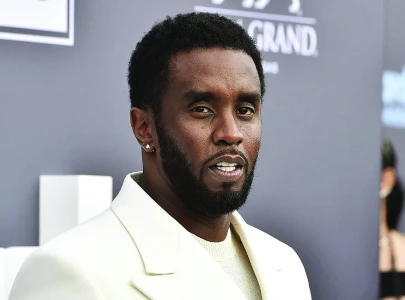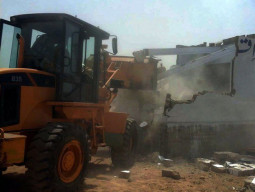
The 26-year-old looks down helplessly at her crying son, who was brought into the world early Tuesday in the makeshift relief camp.
Wearing a tattered, red, Sindhi dress with a thin scarf covering her head, a frail Jannan says the baby has been named Juma after his grandfather.
“I haven’t been able to breastfeed him since he was born and we have nothing else to feed him to make him stop crying,” says a weary Jannan, sitting on a dirty scarf laid out on the concrete ground.
She fled her village close to the submerged town of Sajawal last week with her husband, their two young children - a five-year-old daughter and a three-year-old boy - and her blind mother-in-law, along with their sparse belongings.
Her husband Ahmed Surjo, a farm labourer in the rice and sugarcane fields, says that with two cows, three goats and plenty of grain to eat at home, they felt relatively rich.
“Every man among the one hundred families in the village had a job to do, a home to live in and a family to head,” he reminisced. “Now we are all beggars.”
Clad in shalwar kameez and simple sandals, Ahmed said he has not been able to find work since they arrived in Thatta.
“What shall we do? I can’t beg,” he questions helplessly.
Meanwhile, health officials said they fear that thousands of babies will be born in the flood-affected areas over the next six months and are at severe risk of malnourishment because of the scarce food supply.
The floods have so far claimed at least 147 lives in Sindh, officials say, mostly women and children, who became ill because of the unhygienic living conditions or from waterborne bacteria.
“The risk factor through the spread of lethal disease increases when a large number of children are stuffed in the crowded atmosphere of the camps and we see no government action to provide them with adequate healthcare facilities,” said former head of the Pakistan Medical Association, Dr Shershah Syed.
Zahida Ali, 25, an oval-faced woman from Jannan’s village wearing a purple shalwar suit and blue scarf, gave birth to her baby, Janoo, late Monday night.
“I am hungry, that’s why he is hungry,” she says, with desperation in her eyes. “I want to eat not to save my life but to keep my baby alive.”
Baby girl born in KESC Camp Thatta
Apart from the two boys born in Makli, a baby girl was also born to Rukhsana, who is presently staying in Karachi Electric Supply Company’s (KESC) Care Camp.
The 30-year-old woman arrived at the camp five days ago with her husband and children. She was provided medical support in the camp and was later taken to Civil Hospital, Thatta. She started having labour pains on Aug 31 when she gave birth to a 5.06-kilogramme, healthy child. The mother and the child, who has been named Naveeda, have returned to the camp and are doing well, said a KESC statement.
Naveeda has two brothers and a sister. Her father, 35-year-old Javed Mallah, worked as a donkey cart labourer at a urea shop in Sajawal until his family was displaced by the floods. The Makli Camp is one of the three flood relief camps run by the KESC in Thatta district, where the utility is providing shelter, food and medical help to over 5,000 displaced persons.
Published in The Express Tribune, September 2nd, 2010.

















COMMENTS (1)
Comments are moderated and generally will be posted if they are on-topic and not abusive.
For more information, please see our Comments FAQ